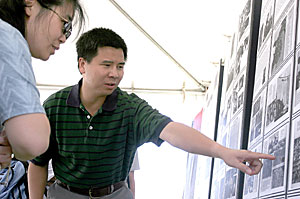 |
|
CLAIRE C. LAURENCE/Arizona Daily Wildcat
|
Planetary science research associate Fushi Wen (left) and Professor of Planetary Sciences Zhongguo Xiong take in an exhibition titled "Undeniable History" on the UA Mall yesterday.
|
|
|
By Troy J. Acevedo
Arizona Daily Wildcat
Wednesday, May 4, 2005
Print this
A piece of history left almost completely forgotten by today's society was presented on the UA Mall yesterday by a group of Chinese students who sought remembrance.
The Association of Chinese Students and Scholars displayed "The Unforgotten History: Let Facts Tell" to ensure that the millions of people who died in the Sino-Japanese War are not forgotten.
"This part of history has been ignored by all parties involved," said Lei Zhao, a graduate student in systems and industrial engineering. "After World War II the governments chose to forget about what had happened."
Dozens of students lined up to look over the slides that chronicled in graphic detail the history and atrocities that occurred during the eight-year occupation of some Eastern Chinese provinces.
"I had heard about this war before but didn't realize how deep it really went," said Elizabeth Palmer, a religious studies senior. "I really believe that this is a powerful way of reminding people about what really happened."
The idea for this event came about a few weeks ago in light of the pending appointment of Japan to the United Nations Security Council, said Jinwei Cao, event organizer and graduate student in the Eller College of Management.
"In the western world, they have a much different view on Chinese and Japanese history," said Kun Hua, a finance graduate student. "The current governments refuse to acknowledge or apologize for what happened. How can the United Nations Security Council consider this and ignore history?"
Students stared in amazement at the photos of tortured bodies, mass graves, young women used as prostitutes and statistics revealing how this part of World War II is barely known or taught.
"A real goal of this is to not only honor those who died, but to prevent these types of crimes from ever happening again," Zhao said.
Although more than 200 students stopped to look at the information, many of whom walked away with the desired message, the ACSS members said they believed they could still do a better job of getting the word out.
"Many students came, but the more people who know about these crimes, the better off the world will be," Cao said.
